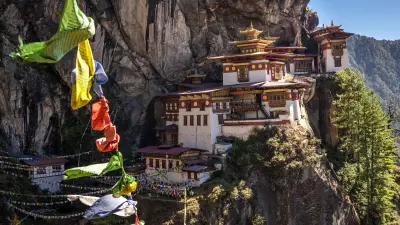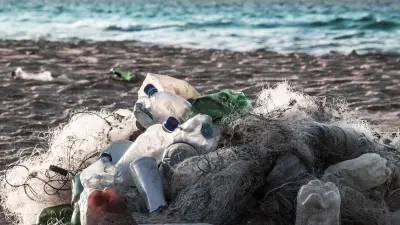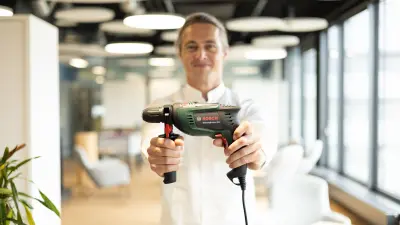Happiness for the people, in harmony with climate and nature protection

Bhutan, the land of collective happiness, faces climate change challenges while being committed to climate and nature protection. Bosch Power Tools, in partnership with WWF Germany, supports projects that help rural communities sustainably secure their livelihoods.
The small kingdom of Bhutan is located in the middle of the Himalayan mountains and is sometimes called the Switzerland of Asia thanks to its impressive mountain formations. Yet as breathtaking as the landscape is, it is difficult for the rural population to find enough arable land on the steep slopes. The local people live mainly from livestock farming and agriculture. In addition, the effects of climate change are already being felt: the springs provide less water than in the past, on a more irregular basis – or they have completely dried up, making it increasingly difficult to obtain both drinking water and water for agriculture.

At the same time, Bhutan attaches great importance to keeping nature intact. More than half of the land is protected, and the country’s constitution stipulates that at least 60 percent of the land must remain forested. In addition, Bhutan has committed to remain completely climate-neutral – and is the only country in the world to have achieved this goal. Bhutan is also the only country in the world to have introduced a happiness index, the so-called “Gross National Happiness Index”. While in the rest of the world, gross domestic product is considered a measure of social prosperity, Bhutan’s index is a sustainable approach that takes account of environmental and social factors, as well as economic aspects.
Since 2023, Power Tools has been supporting four WWF projects, including one in Bhutan. The WWF is working together with the local partner organization Tarayana Foundation. Examples from the villages of Balakhop and Rangtse show how economic progress is possible in harmony with nature.
Water for all: a collaborative project is changing life in Rangtse
The village of Rangtse in the mountains of the Haa district had been suffering from acute water shortages for years. Phub Rinchen works for the Tarayana Foundation as a water official in the village and vividly remembers those difficult days: “There was only one water source for the whole community,” he says. “As the population grew, the burden on the outdated infrastructure became clear. The original water tank was only designed for 23 households and was no longer able to meet demand,” explains Phub.

As part of the WWF project, a second well was tapped in collaboration with the villagers. To do this, the spring was first secured to ensure it would not slip away and silt up, thereby preventing seepage loss of the water. Simple bamboo water filters immediately at the well first clean the water before pipes carry it into large collection tanks. These serve as a reservoir for when there is less water in the well before the start of the spring monsoon. Pipes to the distribution points in the village were also installed. Today, the population has constant access to clean water. Each household pays into a community water fund which is responsible for maintaining the water supply. “We are incredibly grateful for this second well,” says Phub Rinchen. Thanks to the additional new greenhouses and better irrigation, families can now grow their own vegetables, even out of season. Hygiene and sanitation have also improved significantly.

Engineering to overcome steep slopes: new farmland for Balakhop
Besides water, arable land is also scarce in the village of Balakhop. Firstly, the farmers’ fields must be as close to the village as possible to frighten off invading animals such as wild boars and monkeys if necessary. Secondly, the surrounding forests are protected and must not be cleared. Another challenge is that the village is located on a mountain slope. There are almost no flat fields. In order to gain additional arable land, it is necessary to dig terraces out of the slope. This is laborious work for which Tarayana provides the residents with technical equipment such as tractors. Power Tools also sent a series of power tools required for the project to Bhutan, such as circular saws and orbital sanders. The tools provide valuable help in building retaining structures for the terraces. In total, nine hectares of additional arable land have already been created from previously unusable land, benefiting 24 households. The entire area, which has been terraced here and in other villages, now covers almost 50 hectares.

-

Terrace farming has allowed for additional agricultural land in Balakhop village. © WWF -

Bosch power tools in use for building retaining structures for the terraced fields. © WWF
Questions for the WWF
Dr. Stefan Ziegler is a biologist and responsible for projects in Southeast Asia at WWF Germany. He has been working for the WWF for over 20 years and has led numerous projects in the area of plastic waste and marine pollution.
Stefan, why is it important that the WWF and Power Tools support the population in Bhutan?
In Bhutan we know how important it is to keep nature intact. For example, 51 percent of the country’s area is already protected. But outside the protected areas, there are very few concepts for sustainable land use and the population is still very poor. In order to find long-term solutions, a good balance of benefits and protection is needed – also in order to mitigate the consequences of climate change.
What is the main aim of the project?
The aim of the project is to improve people’s living conditions by 2028, in cooperation with the Bhutanese authorities and local communities, through better water supply and consequently increased food safety and hygiene. This will also contribute to the long-term preservation of the biodiversity and ecosystems of Bhutan’s unique nature.
How is the project organized in the region? How is the cooperation with local authorities and residents going?
We work in Bhutan with the Tarayana Foundation, a local non-governmental organization focused on socio-economic assistance to help people help themselves. Together with Tarayana and its staff, we are implementing measures aimed at improving the sustainable use and marketing of local products, in order to generate additional income for local people without putting an undue burden on nature.
What impact are the measures having on people and nature?
Thanks to modern technology and sustainable projects, villagers have better access to clean water, more arable land and thus better living conditions – without putting too much of a burden on nature. The numbers speak for themselves: Through our work to secure wells, 1364 households with a population of 7713 people now benefit from the improved water supply in our project area in Bhutan.

Summary
By providing technical equipment and promoting sustainable agricultural projects, Bosch Power Tools, together with WWF Germany, contributes to supporting climate neutrality and nature conservation in Bhutan, while simultaneously strengthening local communities.



